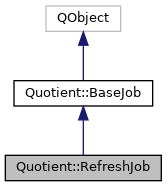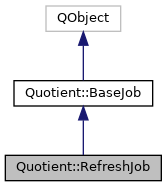 |
libQuotient
A Qt library for building matrix clients
|
 |
libQuotient
A Qt library for building matrix clients
|
Refresh an access token. More...
#include <refresh.h>


Classes | |
| struct | Response |
Public Member Functions | |
| RefreshJob (const QString &refreshToken) | |
| QString | accessToken () const |
| The new access token to use. | |
| QString | refreshToken () const |
| std::optional< int > | expiresInMs () const |
 Public Member Functions inherited from Quotient::BaseJob Public Member Functions inherited from Quotient::BaseJob | |
| BaseJob (HttpVerb verb, const QString &name, QByteArray endpoint, bool needsToken=true) | |
| BaseJob (HttpVerb verb, const QString &name, QByteArray endpoint, const QUrlQuery &query, RequestData &&data={}, bool needsToken=true) | |
| QUrl | requestUrl () const |
| bool | isBackground () const |
| Status | status () const |
| Current status of the job. | |
| QString | statusCaption () const |
| Short human-friendly message on the job status. | |
| QByteArray | rawData (int bytesAtMost) const |
| Get first bytes of the raw response body as received from the server. | |
| const QByteArray & | rawData () const |
| Access the whole response body as received from the server. | |
| QString | rawDataSample (int bytesAtMost=65535) const |
| Get UI-friendly sample of raw data. | |
| QJsonObject | jsonData () const |
| Get the response body as a JSON object. | |
| QJsonArray | jsonItems () const |
| Get the response body as a JSON array. | |
| template<typename T > | |
| T | loadFromJson (auto keyName, T &&defaultValue={}) const |
| Load the property from the JSON response assuming a given C++ type. | |
| template<typename T > | |
| T | takeFromJson (auto key, T &&defaultValue={}) |
| Load the property from the JSON response and delete it from JSON. | |
| int | error () const |
| Error (more generally, status) code. | |
| virtual QString | errorString () const |
| Error-specific message, as returned by the server. | |
| QUrl | errorUrl () const |
| A URL to help/clarify the error, if provided by the server. | |
| JobBackoffStrategy | currentBackoffStrategy () const |
| Get the back-off strategy for this job instance. | |
| void | setBackoffStrategy (JobBackoffStrategy strategy) |
| Set the back-off strategy for this specific job instance. | |
| JobBackoffStrategy::duration_t | getCurrentTimeout () const |
| Q_INVOKABLE Quotient::BaseJob::duration_ms_t | getCurrentTimeoutMs () const |
| JobBackoffStrategy::duration_t | getNextRetryInterval () const |
| Q_INVOKABLE Quotient::BaseJob::duration_ms_t | getNextRetryMs () const |
| std::chrono::milliseconds | timeToRetry () const |
| Q_INVOKABLE Quotient::BaseJob::duration_ms_t | millisToRetry () const |
Additional Inherited Members | |
 Public Types inherited from Quotient::BaseJob Public Types inherited from Quotient::BaseJob | |
| enum | StatusCode { Success = 0 , NoError = Success , Pending = 1 , WarningLevel = 20 , UnexpectedResponseType = 21 , UnexpectedResponseTypeWarning = UnexpectedResponseType , Unprepared = 25 , Abandoned = 50 , ErrorLevel = 100 , NetworkError = 101 , Timeout , Unauthorised , ContentAccessError , NotFound , IncorrectRequest , IncorrectResponse , TooManyRequests , RateLimited = TooManyRequests , RequestNotImplemented , UnsupportedRoomVersion , NetworkAuthRequired , UserConsentRequired , CannotLeaveRoom , UserDeactivated , FileError , AccountLocked , UserDefinedError = 256 } |
| Job status codes. More... | |
| using | duration_ms_t = std::chrono::milliseconds::rep |
 Public Slots inherited from Quotient::BaseJob Public Slots inherited from Quotient::BaseJob | |
| void | initiate (Quotient::ConnectionData *connData, bool inBackground) |
| void | abandon () |
| Abandon the result of this job, arrived or unarrived. | |
 Signals inherited from Quotient::BaseJob Signals inherited from Quotient::BaseJob | |
| void | aboutToSendRequest (QNetworkRequest *req) |
| The job is about to send a network request. | |
| void | sentRequest () |
| The job has sent a network request. | |
| void | statusChanged (Quotient::BaseJob::Status newStatus) |
| The job has changed its status. | |
| void | retryScheduled (int nextRetryNumber, Quotient::BaseJob::duration_ms_t inMilliseconds) |
| A retry of the network request is scheduled after the previous request failed. | |
| void | rateLimited () |
| The job has been rate-limited. | |
| void | finished (Quotient::BaseJob *job) |
| The job has finished - either with a result, or abandoned. | |
| void | result (Quotient::BaseJob *job) |
| The job has finished with a result, successful or unsuccessful. | |
| void | success (Quotient::BaseJob *) |
| The job has finished with a successful result. | |
| void | failure (Quotient::BaseJob *) |
| The job has finished with a failure result Emitted together with result() when the job resulted in an error. Mutually exclusive with success(): after result() is emitted, exactly one of success() and failure() will be emitted next. Will not be emitted in case of abandon()ing. | |
| void | downloadProgress (qint64 bytesReceived, qint64 bytesTotal) |
| void | uploadProgress (qint64 bytesSent, qint64 bytesTotal) |
 Static Public Member Functions inherited from Quotient::BaseJob Static Public Member Functions inherited from Quotient::BaseJob | |
| template<typename... StrTs> | |
| static QByteArray | makePath (QByteArrayView base, StrTs &&... parts) |
| static JobBackoffStrategy | defaultBackoffStrategy () |
| Get the default back-off strategy used for any newly created job. | |
| static void | setDefaultBackoffStrategy (JobBackoffStrategy defaultStrategy) |
| Set the default back-off strategy to use for any newly created job. | |
 Protected Types inherited from Quotient::BaseJob Protected Types inherited from Quotient::BaseJob | |
| using | headers_t = QHash< QByteArray, QByteArray > |
 Protected Slots inherited from Quotient::BaseJob Protected Slots inherited from Quotient::BaseJob | |
| void | timeout () |
 Protected Member Functions inherited from Quotient::BaseJob Protected Member Functions inherited from Quotient::BaseJob | |
| QByteArray | apiEndpoint () const |
| void | setApiEndpoint (QByteArray apiEndpoint) |
| const headers_t & | requestHeaders () const |
| void | setRequestHeader (const headers_t::key_type &headerName, const headers_t::mapped_type &headerValue) |
| void | setRequestHeaders (const headers_t &headers) |
| QUrlQuery | query () const |
| void | setRequestQuery (const QUrlQuery &query) |
| const RequestData & | requestData () const |
| void | setRequestData (RequestData &&data) |
| const QByteArrayList & | expectedContentTypes () const |
| void | addExpectedContentType (const QByteArray &contentType) |
| void | setExpectedContentTypes (const QByteArrayList &contentTypes) |
| QStringList | expectedKeys () const |
| void | addExpectedKey (QString key) |
| void | setExpectedKeys (const QStringList &keys) |
| const QNetworkReply * | reply () const |
| QNetworkReply * | reply () |
| virtual void | doPrepare (const ConnectionData *) |
| Prepare the job for execution. | |
| virtual void | onSentRequest (QNetworkReply *) |
| Postprocessing after the network request has been sent. | |
| virtual void | beforeAbandon () |
| virtual Status | checkReply (const QNetworkReply *reply) const |
| Check the pending or received reply for upfront issues. | |
| virtual Status | prepareResult () |
| An extension point for additional reply processing. | |
| virtual Status | prepareError (Status currentStatus) |
| Process details of the error. | |
| QJsonValue | takeValueFromJson (QAnyStringView key) |
| Retrieve a value for one specific key and delete it from the JSON response object. | |
| void | setStatus (Status s) |
| void | setStatus (int code, QString message) |
| void | forceResult (QJsonDocument resultDoc, Status s={ Success }) |
| Force completion of the job for sake of testing. | |
| void | setLoggingCategory (QMessageLogger::CategoryFunction lcf) |
| Set the logging category for the given job instance. | |
| ~BaseJob () override | |
 Static Protected Member Functions inherited from Quotient::BaseJob Static Protected Member Functions inherited from Quotient::BaseJob | |
| static QUrl | makeRequestUrl (const HomeserverData &hsData, const QByteArray &encodedPath, const QUrlQuery &query={}) |
| Construct a URL out of baseUrl, path and query. | |
 Properties inherited from Quotient::BaseJob Properties inherited from Quotient::BaseJob | |
| QUrl | requestUrl |
| int | statusCode |
Refresh an access token.
Refresh an access token. Clients should use the returned access token when making subsequent API calls, and store the returned refresh token (if given) in order to refresh the new access token when necessary.
After an access token has been refreshed, a server can choose to invalidate the old access token immediately, or can choose not to, for example if the access token would expire soon anyways. Clients should not make any assumptions about the old access token still being valid, and should use the newly provided access token instead.
The old refresh token remains valid until the new access token or refresh token is used, at which point the old refresh token is revoked.
Note that this endpoint does not require authentication via an access token. Authentication is provided via the refresh token.
Application Service identity assertion is disabled for this endpoint.
|
explicit |
| refreshToken | The refresh token |
|
inline |
|
inline |
|
inline |